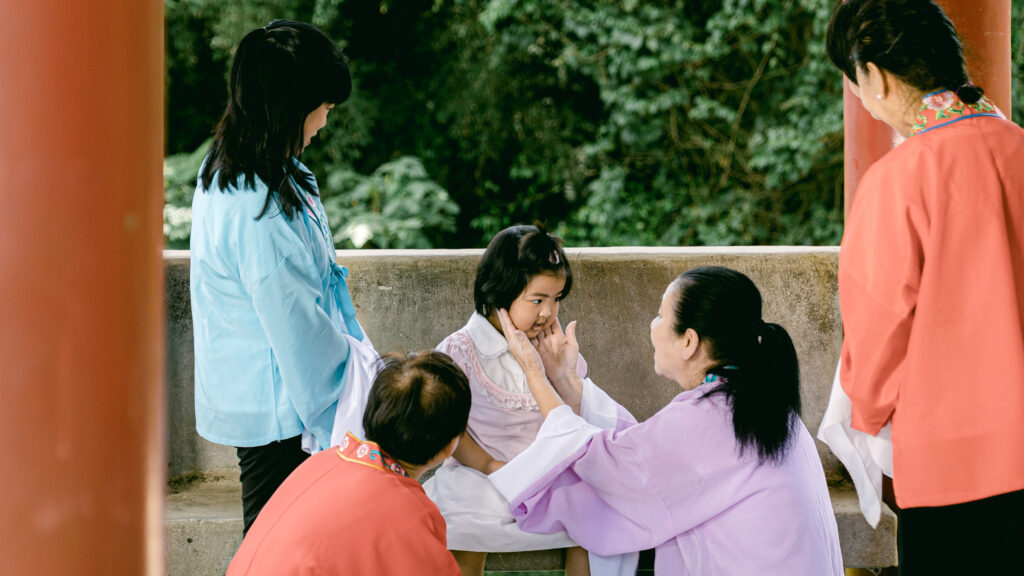
In Ah-Ma: A Tale of Two Generations, director Ying Chu crafts a deeply personal story that bridges the gap between traditional Taiwanese culture and modern Western life. The film explores the journey of Na-Na, a second-generation immigrant navigating her identity between two worlds, while also honoring the legacy of her grandmother through the traditional Taiwanese opera, Gezaixi. Drawing from her own experiences as a Taiwanese immigrant in Australia, Chu blends cultural heritage with contemporary storytelling, offering a unique perspective on the immigrant experience. In this interview, Chu discusses the inspiration behind Ah-Ma, the challenges of incorporating cultural elements, and her vision as a cross-cultural filmmaker.
Indie Cinema: “Ah-Ma” feels deeply personal, how much of your own story did you see in Na-Na’s journey? How do you think your cross-cultural experience has enriched your perspective as a director?
Ying Chu: Na-Na, as a second-generation immigrant in the film, is confident and develops her passion to be herself. When I immigrated to Australia from Taiwan and started to learn filmmaking, I wished to be a different kind of Asian woman—confident and true to myself. Na-Na represents my dream, and I am now creating the life I envision. My cross-cultural background allows me to see different people’s lives. As a director, I believe that shaping characters is a key aspect of filmmaking. My experiences help me build authentic characters and portray a variety of personalities.
Indie Cinema: Gezaixi, a traditional Taiwanese opera, plays a significant role in the film. Why was it important for you to incorporate this cultural element into the narrative, and what challenges did you face in doing so? How do you think Western audiences, who may not be familiar with this art form, will connect with it?
Ying Chu: Gezaixi is a traditional form of local art performance in Taiwan, and I think it is an excellent way to introduce my hometown to audiences. The story was created in 2022; before that, I hadn’t gone back to Taiwan to see my parents for three years. The feeling of ‘missing’ them became the motivation for this story, which led to the creation of Ah-Ma. As you mentioned, the challenge is how to convey this to the audience. It took about two months to develop this script. I discussed it with my teacher to find a balance between the story and Gezaixi. I used the same melody with dance to simplify Gezaixi. Even if the audience doesn’t understand the lines of Gezaixi, when Na-Na sings the same melody as Ah-Ma, I believe the emotion of ‘missing’ will resonate with them.
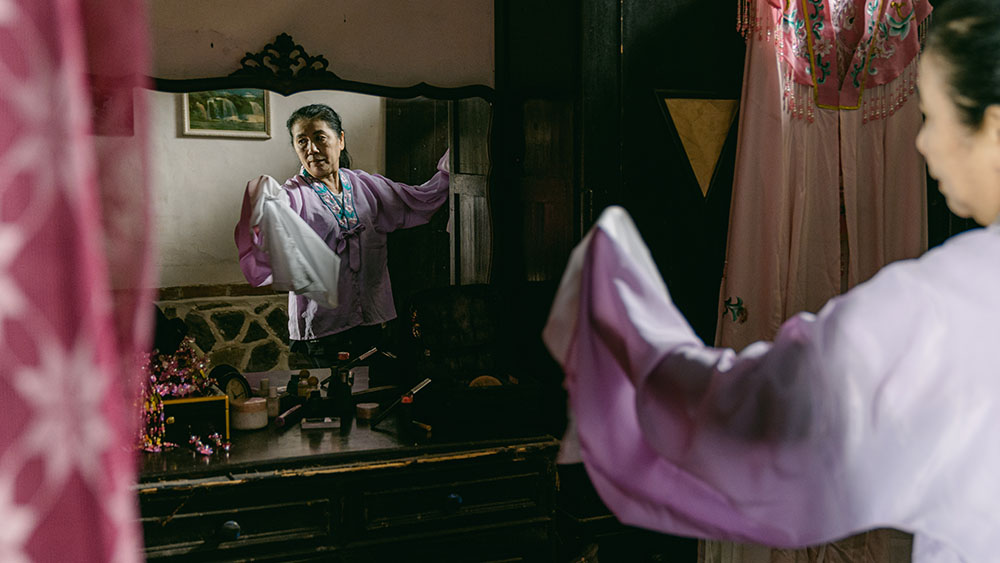
Indie Cinema: The film explores the relationships between three generations of women in an Asian family. What message do you hope to convey about these intergenerational bonds, particularly in the context of migration and cultural identity?
Ying Chu: Traditional and modern, Western and Eastern. Two different countries and three generations. As a first-generation immigrant in Australia, I am learning a new culture while holding onto my own, and this cultural root is unmovable. ‘Transformation’ is an experience that all immigrants undergo. In traditional Asian societies, women are often seen as the weaker group, but their roles can be viewed very differently in Western countries. The message I want to convey is that while you have your traditional roots and may struggle to balance two different cultures, such as family and career, you can still find independence and strength in your new community.
Indie Cinema: You mentioned overcoming location and language barriers during filming. Can you elaborate on some specific challenges you and your team faced, and how you navigated them?
Ying Chu: This film was produced in Taiwan and Australia and served as my graduate project for my undergraduate degree. As a student production, we didn’t have the budget to secure ideal locations, which presented a challenge. Additionally, since the project was cross-country, the internet was the only way I could communicate with the crew and actresses in Taiwan during pre-production. Despite speaking the same language, I often worried that our communication might not be fully understood.
The film uses both English and Taiwanese languages. Na-Na, one of the characters, can’t speak Taiwanese but must sing in Gezaixi, a traditional Taiwanese opera style. This language barrier added another layer of complexity. Additionally, our editor only understood English and had to navigate these linguistic challenges too. Overall, the film took nine months to produce. Despite these challenges, I believe that our passion for filmmaking was what helped us navigate and overcome these obstacles.
Indie Cinema: Your team included members from both Taiwan and Australia. How did this blend of perspectives influence the final product, and what did you learn from working in such a diverse environment?
Ying Chu: The biggest differences between Taiwan and Australia are in cinematography and art direction. Taiwanese films excel at capturing human relationships through the camera, which is something I admire. I enjoy using movement to present character dynamics, so I felt this could be a strong area for collaboration.
For ‘Ah-Ma,’ I wanted to offer audiences a fresh perspective on traditional cultures. This is why the art direction, including costume, set design, makeup, and props, was crucial. I gave the art departments in both Taiwan and Australia a lot of creative freedom, allowing them to bring their unique perspectives to the project. Working in this diverse environment was a new challenge, but it was rewarding, and we are very satisfied with the outcome. This experience taught me the value of blending different cultural perspectives, which can enrich a film’s storytelling and visual appeal.
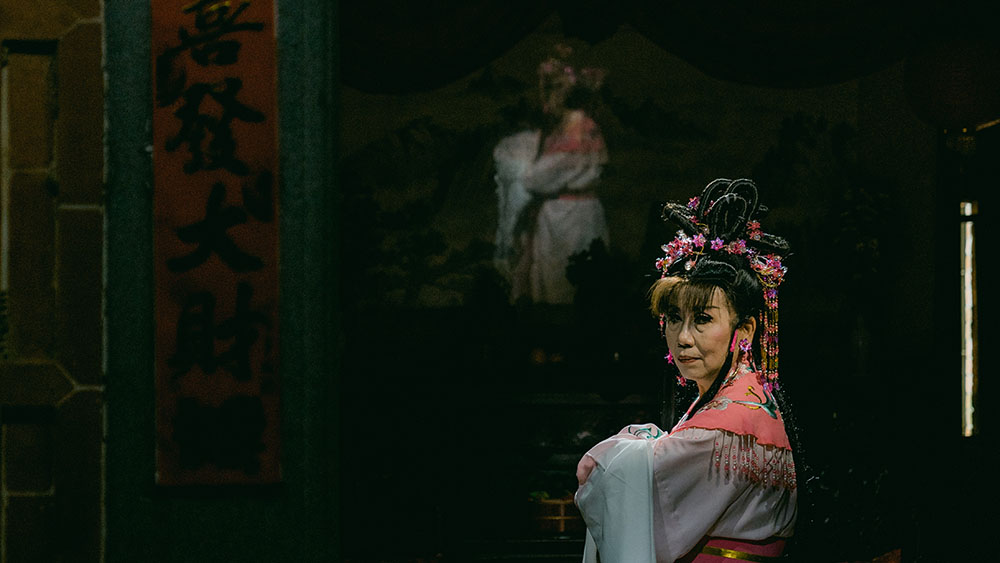
Indie Cinema: Na-Na’s journey from Taiwan to Australia mirrors your own transformation. How did you approach her character development, and what aspects of her story do you find most relatable? Were there any moments during the writing or filming process that felt particularly cathartic?
Ying Chu: Although Na-Na is a second-generation immigrant, she was born in Taiwan and stayed with her grandmother until she was four years old. These early memories serve as the ‘roots’ that stay with her, deeply influencing her life. Even if she forgets the language, the melodies from her childhood are ingrained in her heart and cannot be overlooked.
Na-Na’s decision to stay in Australia and her sense of independence reflect my own aspirations. She doesn’t feel bound by traditional Chinese culture, which aligns with my vision for her character. One of the most cathartic moments during the writing and filming process was when Na-Na stands on stage to sing Gezaixi, and the scene where little Na-Na calls out for Ah-Ma. These moments are particularly powerful and resonate deeply with my own experiences and emotions.
Indie Cinema: You have a passion for blending Western and Eastern cultures in your work. How does “Ah-Ma” reflect this artistic vision, and how do you think this blend resonates with international audiences?
Ying Chu: Although Ah-Ma is a story rooted in Taiwanese traditional culture, I have incorporated a blend of Western and Eastern influences to make it resonate more broadly. The scene setting, art direction, and dialogue strongly reflect Eastern cultural elements, immersing the audience in a distinctly Taiwanese atmosphere. On the other hand, the cinematography, editing, and music draw inspiration from Western styles, creating a unique fusion of both worlds.
The characters themselves embody this blend, with their personalities reflecting both Eastern and Western values. By integrating these diverse cultural influences, I believe Ah-Ma can resonate with international audiences, offering them a fresh perspective on traditional Taiwanese culture while also making it relatable through familiar Western storytelling techniques.
Indie Cinema: “Sister – We are Family” and “Chinese Pioneers – Western Australia” both explore themes of cultural heritage and identity. How did working on these documentaries influence your approach to “Ah-Ma”?
Ying Chu: Working on Sister – We are Family and Chinese Pioneers – Western Australia significantly influenced my approach to Ah-Ma, particularly in storytelling and character development. Firstly, the storytelling styles of these documentaries have impacted how I shaped Ah-Ma. The film doesn’t rely heavily on visual effects; instead, it focuses on the characters and their emotional journeys. In Sister, I explored the stories of eight women from different backgrounds, brought together by Chinese dance. It was challenging to convey their stories on screen, and I dedicated a lot of time to building those narratives. This experience taught me the importance of making audiences feel the emotions of the characters. The powerful character portrayals in Sister helped me understand how to develop and depict characters effectively.
Secondly, themes of cultural heritage, identity, and the immigrant experience have always intrigued me. These themes are central to both Sister and Chinese Pioneers, and I believe this interest has allowed me to bring depth and authenticity to Ah-Ma. Working on these documentaries deepened my appreciation for these themes, and I felt confident that I could translate that into compelling fiction.
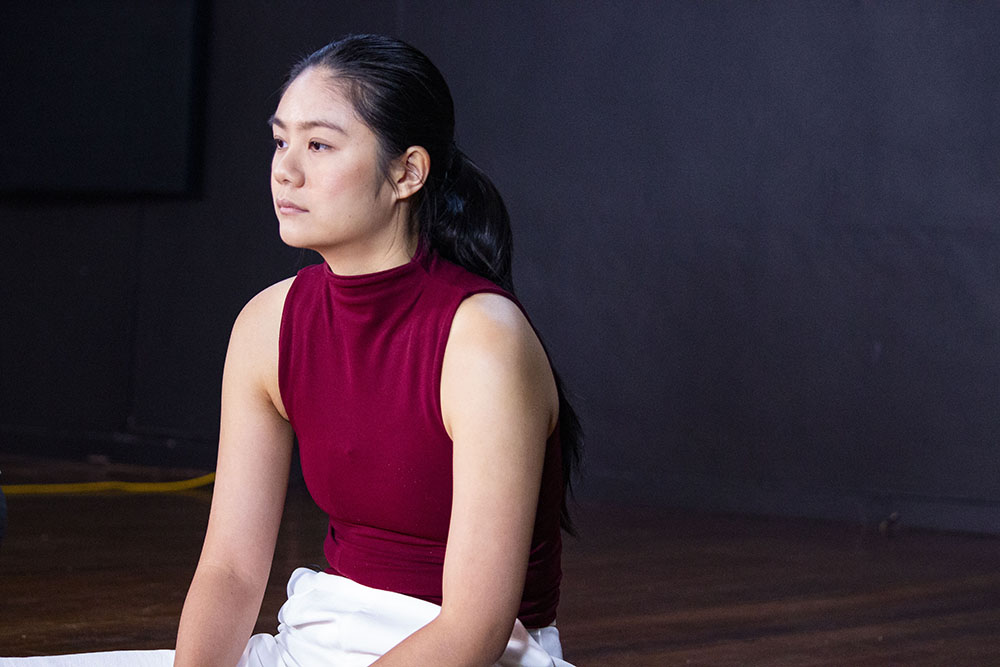
Indie Cinema: Given that “Ah-Ma” was a 100% student production, what unique challenges did this present, and how did these experiences contribute to the final film?
Ying Chu: As a 100% student production, Ah-Ma presented some unique challenges, but it also offered valuable learning experiences. In film school, the creativity and passion of students are undeniable, regardless of the country. However, we faced challenges related to limited resources and finances, which naturally affected the quality of the film. This made the pre-production stage especially crucial, as we had to carefully plan and prioritize to make the most of what we had.
We were constantly problem-solving and finding creative solutions to work within our constraints. The fact that we were still learning gave us the freedom to experiment and try new things without the pressure of a high-budget production. While Ah-Ma may not be perfect, I believe it tells a compelling story that will resonate with audiences. The experience of overcoming these challenges and working with a dedicated team contributed significantly to the final film, making it a project we are proud of.
Indie Cinema: Were there any particular filmmakers or films that inspired your approach to “Ah-Ma,” either in terms of style or thematic exploration?
Ying Chu: Ang Lee is a Taiwanese filmmaker who has greatly inspired my approach to Ah-Ma. I admire how he delves deeply into character development and the intricacies of human relationships in his films. His storytelling style, which often focuses on the subtle dynamics between people, resonates with me and influenced how I portrayed the characters in Ah-Ma. Additionally, I find inspiration in the work of Yimou Zhang, a renowned Chinese filmmaker. His films often emphasise traditional cultural values, and his approach to art direction, which richly incorporates Chinese aesthetics, has also influenced the visual style of Ah-Ma.
Indie Cinema: What’s next for you as a filmmaker? Are there any upcoming projects you are developing now?
Ying Chu: I’m currently working on a short documentary about the LGBTQ community in Western Australia. This project allows me to connect with new communities and explore diverse stories, which is something I am passionate about. I’m also collaborating with peers from different backgrounds to further develop my filmmaking skills.
Looking ahead, I plan to focus on documentary storytelling in 2025, with a particular interest in immigrant stories. While my past work has often centered on Chinese immigrants, I aim to broaden my perspective and engage with various communities. This will not only enhance my understanding of different cultural experiences but also add depth to my next short film.
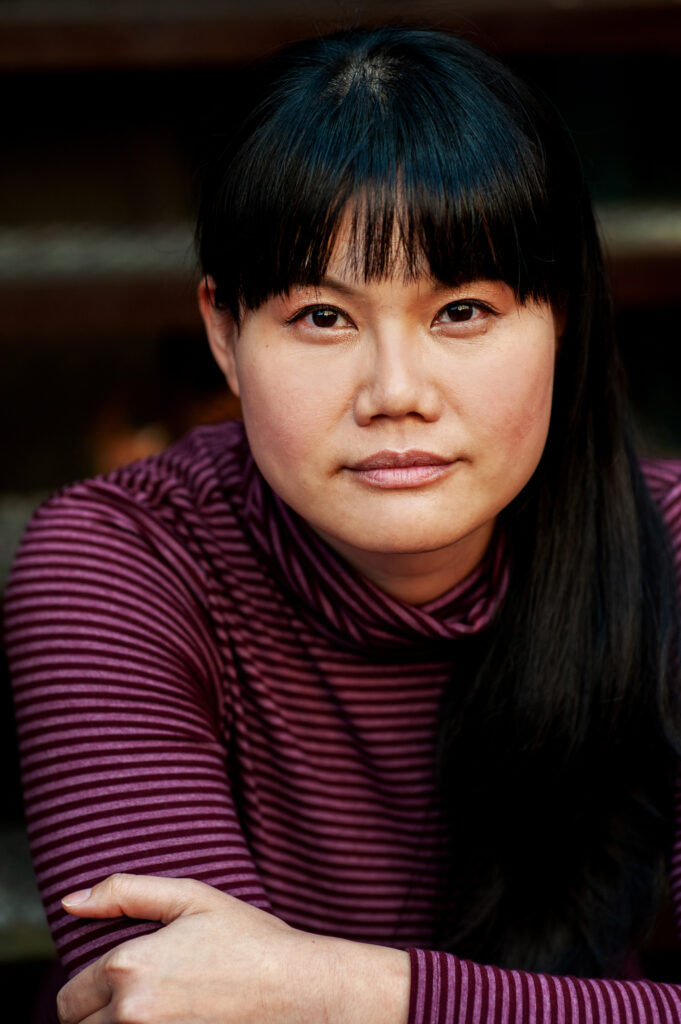
Biography of Ying Chu
Born in Taichung, Taiwan, Ying Chu moved to Australia in 2010, where her passion for film flourished. After completing a UNI Preparation course at Edith Cowan University in 2019, she specialized in producing and directing, creating four independent films. Her documentary Sister – We are Family, supported by the Chung Wah Association Perth, won an award at the Hong Kong Indie Film Festival. Chinese Pioneers – Western Australia, which explores the history of Chinese immigrants, earned international recognition and an Honorable Mention at the WA Screen Culture Awards. Ying’s work blends Western and Eastern cultures, highlighting diversity in globally resonant stories.
Official Facebook page of “Ah-Ma: A Tale of Two Generations” –
